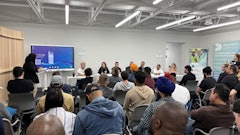
INDUSTRY EVENTS AND THE ART OF PROPAGATION
All industries have conferences and trade shows. At these events, two major tasks occur: information delivery and networking. Pretty basic. Two schools of thought come out of this: either a) “I can’t wait to attend,” or b) “I wouldn’t attend if it’s the last thing I ever do.” I always want to ask those who choose not to attend why? For the most part, the answer is generally the same: “there is nothing worth hearing,” “it’s the same ol’ stuff .” And the most popular, “it’s a waste of time.”
So, again, I ask, why this perception? I am curious, so with an open mind, I decided to do a bit of digging and soul-searching. Aft er a coff ee and about four minutes of my time, I realize that, quite oft en, the communication presented is not what the attendee needs to hear, but what is thought they would like to hear. Once they have experienced this, they become jaded and can’t be bothered to return. Sometimes, the relativity of communication is so far removed from reality that the attendee loses interest. If the communicator is trying to propagate an idea that is not within reach, but fi ts all the buzz in the media—regardless of its relevance to the average attendee—events can come off as a colossal waste of time.
Let me use an example that many of you may be familiar with: climate change. You have most likely heard the name Greta Thunberg, the Swedish activist who has presented at countless conferences. She is very well attended, and many people leave with a feeling of righteousness. However, regardless of the validity of her viewpoints and presentations—there is definitely an issue with our environment—never once has she been able to provide a viable and sustainable solution to the problem, ergo, the perception of time wasted.
Engaging in an event is one thing, as well as listening to what is wrong with the world around us and our industry. Still, it is another thing to provide viable solutions. Quite oft en, the solutions are not what some want to hear. Complaining or pointing out issues is easy, but it is difficult to follow through with a solution. Th e difficult conversations are the conversations that matter, and an industry event should be the venue for just those conversations. A key factor to successful communication is having all the associated relations present and engaged in the topic. Along with this participation, solutions to the issues must be presented. Easier said than done? Absolutely. Hence the difficult conversation.
People are paying money to attend these events, coming away with the same ol’, same ol’, will eventually wear thin. If all the parties are not in attendance, the finger-pointing is usually placed upon the absent party. Effective communication becomes null and void if the insurers, OEMs, shops and suppliers are not all engaged.
With social media’s growing popularity and the ability to contribute without accountability, forums such as face-to-face and industry events are more necessary than ever. Th e rampant slander and false information online are insurmountable and solve absolutely nothing. The ability to communicate with accountability is less prevalent; it is easy to hide online. Sugar coating and propagating a false narrative, or self-infl ating an ego at an industry event, may make for easy listening, but it is a complete waste of time.
It’s nothing personal, but, when the opportunity is given to be the communicator at an event, save the feel-good stuff for the cocktail gathering and social pleasantries. Bring with you some facts, solutions and answers to why. In my opinion, and you are entitled to my opinion, if you, along with others, leave the event feeling uneasy or defensive, it is very possible you just listened to someone tell you what you needed to hear and not what you wanted to hear. Instead of erasing or ignoring it, and contributing to the problem, maybe this is the opportunity to refl ect and start that diffi cult conversation based on what was presented and become part of the solution.
It is never easy, but good communication is not a waste of time.






















